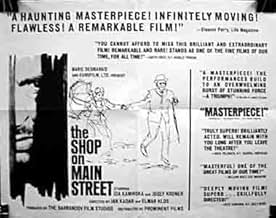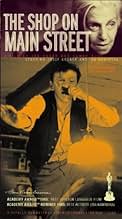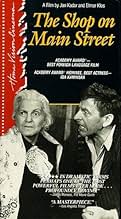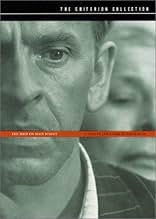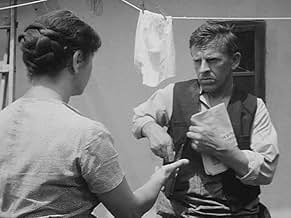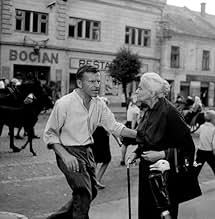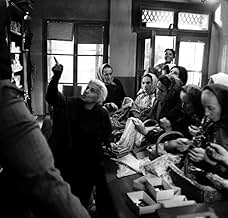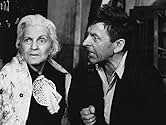VALUTAZIONE IMDb
8,2/10
10.230
LA TUA VALUTAZIONE
Aggiungi una trama nella tua linguaA carpenter in the Fascist Slovak State is appointed "Aryan controller" of a Jewish widow's store.A carpenter in the Fascist Slovak State is appointed "Aryan controller" of a Jewish widow's store.A carpenter in the Fascist Slovak State is appointed "Aryan controller" of a Jewish widow's store.
- Regia
- Sceneggiatura
- Star
- Vincitore di 1 Oscar
- 6 vittorie e 4 candidature totali
Ida Kaminska
- Rozalia Lautmannová
- (as Ida Kaminská)
Frantisek Zvarík
- Markus Kolkocký
- (as Frantisek Zvarík)
Ladislav Farkas
- Young Man
- (non citato nei titoli originali)
Luise Grossová
- Eliasová
- (non citato nei titoli originali)
Juraj Herz
- Jewish Man
- (non citato nei titoli originali)
Recensioni in evidenza
I'll skip over the story and the themes. Other commenters have said wonderful things about that.
Let's talk visuals.
I just have to say I was blown away by almost every single shot of the movie. The black and white color looks gorgeous, and the indoor shots have lots of shadows and texture. The outdoor shots seem overexposed, brilliant, artificial and almost unbearable. The criterion version just looks superlative.
Watch the dinner scene at the start where the man's brother in law is getting drunk with Tony. They are yelling, and having a time, and the camera dives/sweeps/rapidly turns around and falls. It conveys the dizzying nature of the conversation. The outdoor scenes in the first half of the movie have lots of bustle and activity, with lots of turns and shifts of perspective. People will remember the historical themes, but please don't overlook the amazing cinematography (which rightfully doesn't call attention to itself but enhances the emotional impact of every scene). In one scene (where Person X hits Person Y), camera conveys the claustrophobic, almost paranoiac perspective of Person X and sets the rest of the action up. We just knew what was going to happen next here.
The dream sequences/surreal effects were modest and didn't seem too fantastic; they were small enough for a small man overtaken with fear.
Let's talk visuals.
I just have to say I was blown away by almost every single shot of the movie. The black and white color looks gorgeous, and the indoor shots have lots of shadows and texture. The outdoor shots seem overexposed, brilliant, artificial and almost unbearable. The criterion version just looks superlative.
Watch the dinner scene at the start where the man's brother in law is getting drunk with Tony. They are yelling, and having a time, and the camera dives/sweeps/rapidly turns around and falls. It conveys the dizzying nature of the conversation. The outdoor scenes in the first half of the movie have lots of bustle and activity, with lots of turns and shifts of perspective. People will remember the historical themes, but please don't overlook the amazing cinematography (which rightfully doesn't call attention to itself but enhances the emotional impact of every scene). In one scene (where Person X hits Person Y), camera conveys the claustrophobic, almost paranoiac perspective of Person X and sets the rest of the action up. We just knew what was going to happen next here.
The dream sequences/surreal effects were modest and didn't seem too fantastic; they were small enough for a small man overtaken with fear.
One of the finest movies ever made. Ignore revues if they don't praise this film for it's sophistication and emotional power. No other movie portraying the pogroms that initiated the holocaust come close to the depth and cinematic verite that Shop on Main Street depicts. I first saw this movie in the 1960's and it has remained in my psyche ever since in a haunting unnerving memory. Every subsequent viewing I gave it reinforced it's depth and artistic strength. The directing is on a par with Ingmar Bergman, but more direct and devoid of artistic devices. The cinematography is breathtaking (Black and White). Note the scene when the protagonist's confusion is exaggerated by the camera circling around and around, enveloping the viewer in his emotional madness and guilt. This is a must see for anyone seriously interested in the very best movies of all time.
This film is one of the most gripping stories told about Nazi occupied Europe. A small town in 1942 Czechoslovakia feels the changing regime envelop the people, pinning friends against one another, and turning even the most pacifistic men into traitors. Small-time carpenter Tony is married to an attractive, but constantly nagging and complaining, materialistic woman. Seeing her in-laws successful, while exploiting the political advantages of working with the Nazis, makes Tony's wife ever more determined to have a "piece of the fortune" the Jews are said to have been hording. Although refusing to work at a "tower of Babel" the Nazis are erecting as a symbol of their glory (and doing without the money he could have earned), Tony doesn't speak out against the "new order" either.
When Tony finds himself as assistant to an old lady at her failing notions shop (which he "legally" was entitled to take over), he learns about the Jewish community, how everyone looked out for one another, and how these people were no different from other folk in town, if anything they were more human than the rest. Still afraid of retribution from the Nazis and their sympathisers, Tony is in a no-win-situation.
The final scene of this 1966 Best Foreign Film Oscar Winner was likely an inspiration for the final scene in the 1997 Blockbuster "Titanic". This cinematic gem serves as a reminder to the old German saying "Leben und leben lassen" (live and let live). A classic indeed!
When Tony finds himself as assistant to an old lady at her failing notions shop (which he "legally" was entitled to take over), he learns about the Jewish community, how everyone looked out for one another, and how these people were no different from other folk in town, if anything they were more human than the rest. Still afraid of retribution from the Nazis and their sympathisers, Tony is in a no-win-situation.
The final scene of this 1966 Best Foreign Film Oscar Winner was likely an inspiration for the final scene in the 1997 Blockbuster "Titanic". This cinematic gem serves as a reminder to the old German saying "Leben und leben lassen" (live and let live). A classic indeed!
This movie is one of my all-time favorites. It depicts a lazy, self-interested "everyman" caught up in a personal struggle of good and evil. The directors/writers question the moral responsibility of genocide, as smalltown Czechs under Nazi domination respond to their Jewish neighbors. Jews are no longer allowed to own shops, so their businesses' control and ultimate ownership is turned over to Christians -- namely, Nazi sympathizers. One such Christian, brother-in-law of a high-ranking official, is given a button shop, owned by a deaf, elderly Jewish woman, who is not even aware that there is a war going on. Due to her deafness, she has the innocence of a child. The Christian overseer finds that the shop makes no money whatsover, but also learns that the Jewish community supports the old woman and will pay him a salary to watch over her. What develops is a platonic love story between the two, hilariously funny due to the old woman's inability to comprehend the impending doom around her, and her assistant's struggle to shield her from harm while concerned with self-preservation. The movie works on numerous levels -- as a love story, including dreamlike fantasy elements of a bygone world where Nazi horrors don't exist; and as a tale of ultimate moral responsibility. It is a story of basically good people, who say nothing, see nothing, hear nothing, and do nothing when genocide threatens their neighbors, and who thus enable genocide to occur. The brilliant combination of hysterically funny scenes set against a background of impending mass murder brings this film to a life that is lacking in most humorless holocaust-oriented films. The laughter through tears produces an ultimate impact that is emotionally devastating. This film justly received an Oscar for Best Foreign Film when it was released. It was produced during a brief high point of the Czech film industry, prior to Russia's reconquering of the country and squelching any artistic freedom. All the performers are exceptional, particularly the two leads. (After the Russian takeover, actress Ida Kaminski emigrated to New York and attempted to revive the Yiddish Theatre.)
In 1942, in a small town in Czechoslovakia, the poor carpenter Tony Brtko is assigned "Aryanizator" of a small shop on the main street by his fascist brother-in-law Mark Kolkotsky. His greedy wife Evelyn is seduced with the promise of fortune, but Tony finds that the store owned by the deaf and senile seventy eight year-old widow Rozalie Lautmann is bankrupted and the old lady is financially supported by the Jewish community that promises a salary to him to help her.
I have come to feel that the Czech film of the 1960s may be one of the best places and best decades in the history of film. The "new wave" there is far more interesting than anything that came out of France or Italy, and was a decade ahead of the United States.
This film manages to be a serious examination of an ethical conflict but still has a hint of humor and gaiety. Not enough to be offensive or dismissive of the subject matter, but just enough to remind us of the glorious Czech new wave.
I have come to feel that the Czech film of the 1960s may be one of the best places and best decades in the history of film. The "new wave" there is far more interesting than anything that came out of France or Italy, and was a decade ahead of the United States.
This film manages to be a serious examination of an ethical conflict but still has a hint of humor and gaiety. Not enough to be offensive or dismissive of the subject matter, but just enough to remind us of the glorious Czech new wave.
Lo sapevi?
- QuizThis movie was shot exclusively in the small Slovak city of Sabinov.
- BlooperSet in 1942, a German troop train moves through the town. The train is carrying Soviet cold-war era trucks and anti aircraft guns that didn't exist until the 1950s. It's understandable for them to make this substitution since any authentic German equipment would have been scrapped long before.
- Citazioni
Jozef Katz: I don't understand anything any more. But I know one thing. When the law persecutes the innocent, that's the end of it. And those who make the law, too.
- ConnessioniEdited into CzechMate: In Search of Jirí Menzel (2018)
- Colonne sonoreÉn vagyok a falu rossza egyedül
(uncredited)
Written by Lajos Békésy, Imre Garsi and László Patak
Performed by Jozef Kroner, Frantisek Zvarík, Hana Slivková and Elena Zvaríková
I più visti
Accedi per valutare e creare un elenco di titoli salvati per ottenere consigli personalizzati
Dettagli
- Tempo di esecuzione2 ore 8 minuti
- Colore
- Mix di suoni
- Proporzioni
- 1.37 : 1
Contribuisci a questa pagina
Suggerisci una modifica o aggiungi i contenuti mancanti

Divario superiore
By what name was Il negozio al corso (1965) officially released in India in English?
Rispondi

